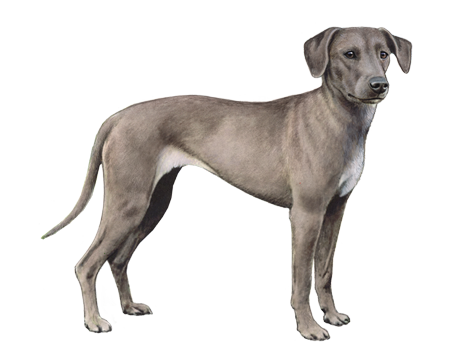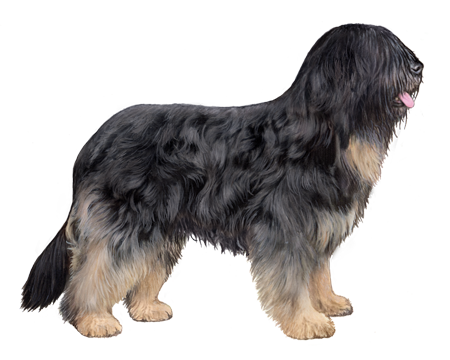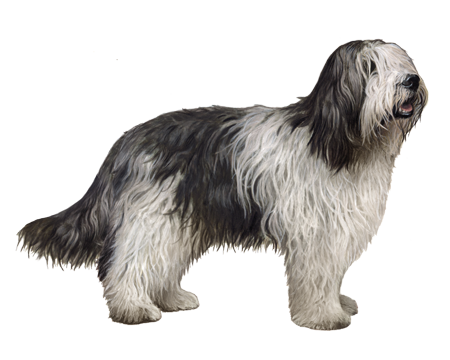
Maremma Sheepdog
The Maremma Sheepdog is a livestock guardian with strong protective instincts and loyalty to its family.
Interested in discovering if your dog is a Maremma Sheepdog?
Check out Wisdom Panel's DNA tests.

Maremma Sheepdog Traits
General Appearance
The Maremma Sheepdog is a strong, muscular dog with a rustic appearance. They have a lively, attentive expression and move with an extended trot.
Coat and Coloring
Maremma Sheepdogs are a double-coated breed. Their undercoats are only abundant in the winter, while their outercoats consist of long hair that can grow up to three inches. The hair on their outercoats is harsh to the touch, straight, and lies flat on their bodies.
Their coats include plenty of hair around the neck and fringes on the hindquarters; the hair is shorter on the muzzle, skull, ears, and front of the limbs.
Maremma Sheepdogs are typically white, though their coat can be shades of ivory, lemon, or pale orange. Those colors are tolerated but not preferred according to the breed standard.
Distinctive Physical Traits
Maremma Sheepdogs are large, solidly-built dogs with deep, rounded chests, muscular loins and thighs, and thick necks. Their tails are well furnished, set low, and are carried level with the back when the dogs are excited.
Maremma Sheepdogs have large noses with wide nostrils, hanging but mobile V-shaped ears, and almond-shaped eyes with black rims that convey a lively and attentive expression.
Maremma Sheepdog Temperament
Traits like intelligence, alertness, courage, and attentiveness are among the top reasons Maremma Sheepdogs make excellent guardians. Maremma Sheepdogs are devoted to their owners and do best in homes where they can both work and join in family activities.
The breed is also affectionate and devoted to its owners. Maremma Sheepdogs will use their size and loud voice as deterrents, which can make them ill-suited to apartment life.
Like all good guardians, Maremma Sheepdogs can be wary of strangers. Regular socialization can help them become more comfortable with unfamiliar people.


Maremma Sheepdog History
The Maremma Sheepdog is an ancient working dog breed that can trace its origins back to the Tibetan Mastiff.
The Cane da pastore Maremmano-Abruzzese, or the dogs of the shepherds of Maremmano and Abruzzese, was first mentioned in Roman literature more than 2,000 years ago. The dogs historically protected sheep and goats from predators like wolves and bears in their native regions of Abruzzi and Maremma, Italy.
Originally separate breeds, the Pastore Abruzzese (shepherd dog of the Abruzzi) and Pastore Maremmano (shepherd dog of the Maremma) crossbred while moving flocks seasonally. The Ente Nazionale della Cinofilia Italiano (the Italian National Dog Association) unified them into a single breed in 1958.
The first Maremma Sheepdogs came to the United States in the 1970s as part of a ten-year research project exploring the effectiveness of livestock guardians. Throughout the study, researchers placed more than 1,000 dogs in 37 states; the results showed that their presence led to decreases in livestock predation.
Maremma Sheepdogs have contributed to a resurgence in the traditional practice of using livestock guardian dogs for flock protection.
Maremma Sheepdog Care
Nutrition
Feed Maremma Sheepdogs a high-quality dog food that is appropriate for their life stage (puppy, adult, senior). Portion out their food with a standard measuring cup and limit treats to no more than 10 percent of their daily calories to avoid overfeeding.
Grooming
Although Maremma Sheepdogs have thick hair, the breed does not require extensive grooming. Brush their coats at least once per week to prevent matting.
Daily brushing during “shedding season” in spring and fall is essential to remove all of the dead hair. Maremma Sheepdogs only need baths if they get into something messy.
Clean their ears and trim their nails to prevent cracking, splitting, and painful overgrowths. Regular dental care that includes at-home teeth brushing and professional cleanings is also an essential part of their grooming routines.
Exercise
Maremma Sheepdogs are working dogs and require a lot of exercise. These smart, active dogs enjoy hiking, running, and swimming and may do well in dog sports like agility, tracking, herding, and obedience.
In addition to high-intensity physical activity, provide mental stimulation with hide-and-seek, puzzle toys, or other interactive games.
Training
Maremma Sheepdogs require consistent training from a young age to help them grow into well-mannered dogs.
The smart, eager-to-please Maremma Sheepdog requires positive reinforcement and rewards, not harsh training techniques, to master basic commands and learn new tricks. Remember to pack your patience!
Early socialization is essential to help these dogs temper their guarding instincts and feel more comfortable with strangers.

Breed Group
Herding
The herding group is a diverse category. These highly intelligent breeds were developed to guard and control the movement of livestock.
Resources
http://fci.be/Nomenclature/Standards/201g01-en.pdf
http://www.maremmaclub.com/history.html
Reviewed July 26, 2020 by Cindy Elston, DVM, MPH


































































